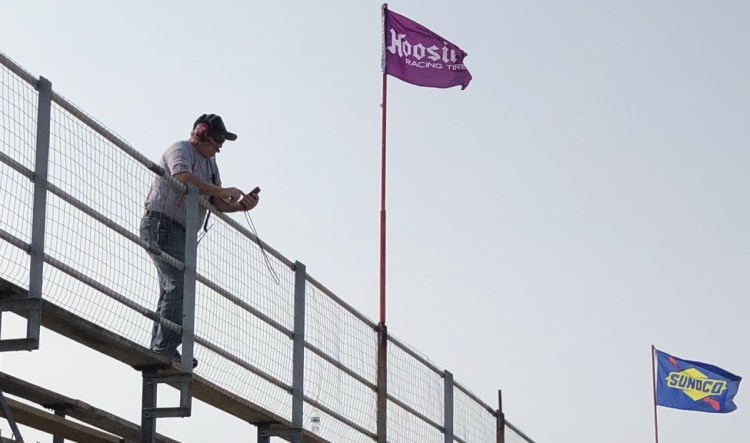OXFORD — More than 15 years ago, Glen Luce’s Oxford 250 was over before it began.
“I was pulling out for practice and the pit steward waved me to go,” Luce, of Turner, recalled Friday during practice for the Sunday’s 45th annual Clark’s Scrap Metals 250. “Billy Whorff took off, even though he was waving to me, and hit me right in the right front. It killed our day right there. It’s just chaos out there sometimes.”
There are a set of eyes to get drivers through the chaos. Qualifying, pit strategy, tire management are all keys to winning the Oxford 250. A good car, a talented driver and a crew chief who knows what he’s doing are all part of the recipe. So, too, is a good spotter.
No one can win the Oxford 250 without one.
“Boy, it would be awful hard,” Luce said. “You’d have to be right on your game, that’s for sure, with a dominant car. Just getting in and out of the pits is chaos. Your chances of getting wrecked are so high — and not even a bad wreck. Just a small bump can (hurt the suspension).”
Most weekend’s, the spotter’s job on a race team is a straightforward one. The spotter watches the races and, via radio communication, relays important information to the driver. He lets a driver know where other cars are relative to his own, gives lap time information and might offer advice about where other cars are finding more success on the race track.
At the Oxford 250, everything changes. It’s no longer a typical race day.
With more than 70 cars expected for Sunday’s race, practice sessions are chaotic, with more than 30 cars on the track at one time — entering and exiting without warning — all traveling at different speeds. During heat races, the intensity is ramped up as drivers try to secure just one of four available qualifying spots. And during the 250-lap main event itself, there’s a crowded pit road to get on and off off with out incident and cars on varying pit strategies.
It’s a lot to keep track of, which is why a driver needs a set of eyes at the top of the grandstand, somebody who can see everything he can’t going on around him.
“You’ve got 45 cars on the track all the time over a three-day period (at the Oxford 250),” said Kevin Alden of Leeds, who has been Luce’s spotter since 2013. “You’ve got to be alert all the time. It’s much more pressure.”
“I’ve been fortunate to work with some great drivers, and I think I communicate well with them so it doesn’t take as long (to form a relationship),” said Steve Tapley, spotter for Ben Rowe. “As long as you’re giving them what they want and not talking too much — a lot of spotters talk too much. You’ve got to be short, sweet and to the point.”
Alden, of Leeds, was sitting in the spotters stand when Luce won the 2015 Oxford 250. A former racer himself, Alden has been working as a spotter for 12 years. He got started with Tommy Ricker in Oxford’s weekly Late Model division before moving over and working with Austin Theriault.
When Theriault’s career took off and the Fort Kent native moved south, Alden moved over to work with Luce’s team.
“It’s just about communication,” Luce said. “Trusting your spotter is probably more in your mind when you’re at a fast track like a Loudon or a Thompson (Connecticut), where you could get hurt. He knows how I drive and what works well. We’re like a good husband and wife team.”
Rowe has worked with Tapley since 2011. He can’t imagine another spotter in his ear.
“It’s just second nature now,” Rowe said. “It’s everything. He does a lot — it’s lap times, it’s restarts, it’s everything. I joke with him that he just stands around and does nothing all day, but he does it all. It’s a tough deal sometimes for guys.”
Tapley, of Deering, New Hampshire, understands the difference between a typical Pro All Stars Series race with 25 cars and the Oxford 250 with it’s 70-car field. Qualifying can be tense, but he doesn’t think there’s any added stress on the spotters.
“I don’t feel pressure, because I’ve been doing it so long,” Tapley said. “It’s more than I don’t want to mess up. I don’t feel it as pressure, I just want to be on my game.”
Alden, though, remembers the time Theriault didn’t make the Oxford 250 in 2010. He wore part of the blame on his shoulders.
“I sat in the spotters stand for about 20 minutes by myself after before I moved,” Alden said. “Yeah, it gets to you. You try not to show it to your driver… That’s how you try to come across, anyway, but it’s stressful. We’re all racing for the same thing.”
Travis Barrett — 621-5621
tbarrett@centralmaine.com
Twitter: @TBarrettGWC
Send questions/comments to the editors.




Success. Please wait for the page to reload. If the page does not reload within 5 seconds, please refresh the page.
Enter your email and password to access comments.
Hi, to comment on stories you must . This profile is in addition to your subscription and website login.
Already have a commenting profile? .
Invalid username/password.
Please check your email to confirm and complete your registration.
Only subscribers are eligible to post comments. Please subscribe or login first for digital access. Here’s why.
Use the form below to reset your password. When you've submitted your account email, we will send an email with a reset code.